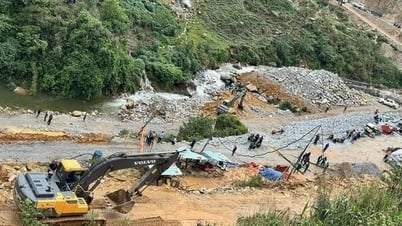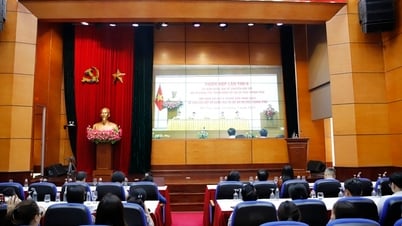 |
- Madam, the General Statistics Office plays an important role in the socio-economic development of the country. Could you elaborate on the importance of statistics in socio-economic development and policy making?
Dr. Nguyen Thi Huong: I completely agree with the statement that: TTTK plays an extremely important role in the development of the country. TTTK is "authentic practical evidence" that helps in policy making and orientation of socio-economic development in an effective and sustainable manner. The important role of TTTK is demonstrated in the following contents:
TTTK provides a comprehensive and objective picture of the socio-economic situation:
TK provides accurate and reliable quantitative indicators on the scale, growth rate, structure of the economy (GDP, CPI, industrial production, agriculture, services...), population, labor, education, health, culture, society, environment... Thereby, we can assess the current state of socio-economic development, achievements, limitations and challenges we are facing.
 |
- Time-based accounting data helps identify development trends and the laws of socio-economic development. This allows forecasting future developments and building appropriate response "scenarios";
- TK data allows comparison of development between regions, between countries, or comparison with set targets. This is the basis for building development plans for regions, provinces/cities as well as determining Vietnam's position in the international arena and learning from experiences of other countries;
TTTK is the foundation for policy making
- Based on the statistics, the Party, Government and policy makers can identify the most pressing issues of the country, the areas that need priority investment and development (for example: High poverty rate in remote areas, increasing environmental pollution in industrial zones...);
- TTTK provides the basis for building specific socio-economic development goals (for example: What is the average annual GDP growth rate, what is the poverty reduction rate...);
- TK analysis helps assess the potential impact of different policies, thereby selecting the most appropriate and effective policies to achieve the set goals. For example, to reduce poverty, policy makers can rely on data on income, expenditure structure, education level of different population groups to design appropriate support programs.
In addition, the TTTK helps monitor and evaluate the effectiveness of policy implementation; Transparency and increased accountability of State agencies; creating and enhancing people's trust in the process of managing and operating the country.
- Could you tell us more about the challenges that people working in accounting are facing?
Dr. Nguyen Thi Huong: In the process of collecting, compiling and publishing statistical data, statistical workers still face specific difficulties and challenges such as:
Firstly, the demand for data and statistical information to serve the Party, the State and information users is increasing; Information content covers the entire socio-economic life; Requires detailed data by industry, economic sector, reporting object...; Especially statistical information related to vulnerable groups in society such as people with disabilities, ethnic minorities, women, children...
 |
Second, many organizations and individuals are not fully aware of the importance of providing information, leading to the provision of incomplete or inaccurate information, or even refusal to provide information. The accounting and reporting systems of units, especially small and medium enterprises (SMEs) and individual business households, are still sketchy and lack standards, making it difficult to collect information. In addition, access to accounting subjects in remote areas, or specific subjects (freelance workers, migrants, etc.) is still limited.
Third, the processing and analysis of accounting data must meet the increasingly high requirements for timeliness and completeness of information, while the process of collecting, processing and publishing information is still complicated. The information technology system serving accounting work is not yet synchronized, many equipment (machines, software...) are old and have not been upgraded in time, causing difficulties in storing, processing and sharing accounting data.
Fourth , accessing and exploiting administrative data to serve accounting work, although having achieved some remarkable results, still faces many difficulties and challenges. Administrative data sources in Vietnam are currently spread across all agencies, ministries and branches, and to access, evaluate, connect and share with these databases requires appropriate regulations, rules and exploitation models/processes .
- As you discussed, separating accounting data by economic sector is one of the difficulties and challenges of accounting agencies. Can you elaborate on this content?
Dr. Nguyen Thi Huong: The 13th National Party Congress determined the structure of economic sectors including: State economy; Collective economy; Private economy; Foreign-invested economy. In which, the State economy plays a leading role; Collective economy coordinates production and business, protects interests and creates conditions for members to improve productivity, production and business efficiency, and develop sustainably; Private economy is encouraged to develop in all sectors and fields that are not prohibited by law, and is supported to develop into strong, highly competitive private economic companies and groups; Foreign-invested economy is an important part of the national economy, playing a major role in mobilizing investment capital, technology, modern management methods, and expanding export markets.
To collect, synthesize and separate TK data by economic sectors, on February 13, 2025, the Minister of Planning and Investment issued Circular No. 07/2025/TT-BKHĐT regulating the classification of TK by economic sector. Difficulties and shortcomings before issuing Circular No. 07/2025/TT-BKHĐT: The unclear scope and content of each economic sector leads to difficulties in compiling GDP and GRDP data according to this classification; The annual enterprise survey only collects information on the performance of enterprises in the previous year. Therefore, the TK indicators collected from the enterprise survey are often not published in a timely manner according to economic sectors as prescribed, but there is a time lag;
 |
The application of classification by type is only implemented in some basic economic indicators and is mainly collected through the General Economic Census, Enterprise Survey, Individual Business Establishment Survey and Investment Capital Survey. To collect complete aggregated data by economic type, it is required to conduct a complete survey or a large sample size while the conditions of time, budget and human resources are not met; State economic types and foreign direct investment economic types are often concentrated in large enterprises, corporations, and general companies, with branches scattered across the provinces. The General Statistics Office allocates to provinces/cities based on the data reported by general companies, corporations, etc. The allocation is often slow, so provinces/cities do not have timely assessment data;
Currently, localities have a need to use information disaggregated by economic type to assess the contribution of each economic type to GRDP. However, the announcement of indicators disaggregated by economic type is often delayed. Therefore, it affects the provision and dissemination of information to serve the management and operation needs of localities and information users; The results of the announcement of economic indicators such as GRDP, implemented investment capital, working labor, etc. are classified according to 3 economic types: State, non-State and foreign direct investment; While the individual and collective economic types also account for a fairly large proportion, the added value (VA) is not separated, so there is no basis for calculating indicators related to this economic type, affecting the analysis and assessment of the socio-economic situation and proposing solutions and development orientations for economic types that are limited and not close to the reality of each locality.
Regarding the basis and principles of classifying accounts by economic type: An economic unit is only classified into one corresponding economic type based on the following criteria in order of priority: Current legal regulations; Owner's equity ratio; Characteristics of each economic type. In addition, the classification of accounts by economic type must ensure the following principles: Ensuring the reflection of the Party's viewpoint on economic sectors; Complying with legal regulations; Ensuring that an economic unit is only classified into one economic type; Ensuring feasibility, inheritance and uniform coding.
Circular No. 07/2025/TT-BKHĐT takes effect from May 1, 2025. To apply the classification of accounting by economic type in accounting work in the coming time, in my opinion, the accounting sector needs to focus on performing the following tasks: Reviewing and determining the list of accounting indicators grouped by economic type in current accounting indicator systems (National accounting indicator system, provincial-level indicator system, indicator systems related to many industries, many fields and regional linkages...); For each indicator grouped by economic type, it is necessary to develop a plan for collection, synthesis, compilation and publication; In particular, integrating information collection by economic type into the current accounting investigation plan and reporting regime; Develop plans, review and compile data series disaggregated by economic type in time and space to serve as a basis for evaluating the implementation of the 13th Party Congress documents and developing plans for the next phase./.
Thank you very much!
“Administrative data sources in Vietnam are currently spread across all agencies, ministries, and sectors, and to access, evaluate, connect, and share with these databases requires appropriate regulations, statutes, and exploitation models/processes.”
(Dr. Nguyen Thi Huong)
Source: https://baophapluat.vn/thong-tin-thong-ke-can-quy-dinh-quy-trinh-khai-thac-phu-hop-post548119.html





![[Photo] President Luong Cuong receives Prime Minister of the Kingdom of Thailand Paetongtarn Shinawatra](https://vphoto.vietnam.vn/thumb/1200x675/vietnam/resource/IMAGE/2025/5/16/52c73b27198a4e12bd6a903d1c218846)
![[Photo] Prime Minister Pham Minh Chinh and Prime Minister of the Kingdom of Thailand Paetongtarn Shinawatra attend the Vietnam-Thailand Business Forum 2025](https://vphoto.vietnam.vn/thumb/1200x675/vietnam/resource/IMAGE/2025/5/16/1cdfce54d25c48a68ae6fb9204f2171a)





















![[Photo] The Prime Ministers of Vietnam and Thailand witnessed the signing ceremony of cooperation and exchange of documents.](https://vphoto.vietnam.vn/thumb/1200x675/vietnam/resource/IMAGE/2025/5/16/935407e225f640f9ac97b85d3359c1a5)































































Comment (0)